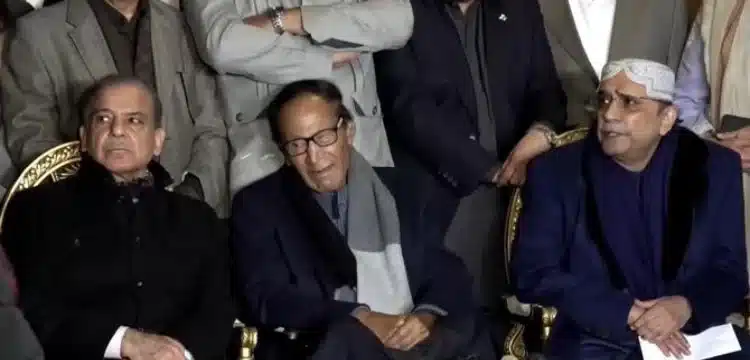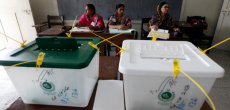[vc_row][vc_column][vc_column_text dp_text_size=”size-4″]In less than a week following the Pakistan General Elections 2024, leaders from the Pakistan Muslim League-Nawaz (PML-N), Pakistan People’s Party (PPP), Muttahida Qaumi Movement-Pakistan (MQM-P), Pakistan Muslim League (PML), Istehkam-e-Pakistan Party (IPP), and the Balochistan Awami Party (BAP) have come together to announce their intention to form a coalition government.
This decision was formalized during a meeting at Chaudhary Shujaat Hussain’s residence on Tuesday, where leaders from the aforementioned political parties engaged in discussions about their strategies for governance.
Read more: PPP To back PML-Ns PM Candidate, Rejects Government Alliance
After the meeting, PPP Co-chairman Asif Ali Zardari spoke to the media, expressing the collective determination to establish the coalition government. He underscored the importance of a unified agenda, emphasizing key areas such as the economy and defense for the progress of Pakistan. Zardari, despite the recent electoral competition, emphasized that the parties involved are not ideological adversaries and can collectively manage the country. He also mentioned the possibility of extending reconciliation efforts to include the Pakistan Tehreek-e-Insaf (PTI).
Addressing the gathering, Shehbaz Sharif expressed gratitude to Chaudhary Shujaat for hosting the meeting and acknowledged the conclusion of the election phase, welcoming the incoming parliament. Emphasizing the need for economic stability, Sharif highlighted the importance of financial strength and the paramount importance of national unity for progress. He mentioned the recent IMF agreement, acknowledging the role of international support in bolstering the country’s economic standing.
Expressing appreciation for Bilawal Bhutto’s voting decision, Shehbaz Sharif remarked on the two-thirds majority that the coalition parties now hold, signifying a significant electoral mandate. He stressed the inclusive representation from different regions of the country and pledged to address the nation’s challenges with effective governance.
MQM’s Khalid Maqbool Siddiqui acknowledged ideological differences but prioritized the well-being of Pakistan over party agendas. The sentiment of unity for national progress echoed across the coalition, indicating a collaborative approach.
Sadiq Sanjrani, representing the BAP, expressed optimism for a better future for all Pakistanis, marking the coalition as a new beginning. Abdul Aleem Khan of the Istehkam-e-Pakistan Party (IPP) remained cautiously optimistic, acknowledging the challenges posed by inflation but highlighting the potential for finding solutions by putting personal agendas aside.
Overall, the coalition’s formation reflects a collaborative spirit and a commitment to addressing the nation’s challenges collectively, with an emphasis on unity and effective governance.[/vc_column_text][/vc_column][/vc_row]











